Index to Flowers in the Order Caryophyllales
Family: Aizoaceae (Stone plants, Carpet weeds, Mesembs)
Carpobrotus acinaciformis Elands Sourfig, Sally-my-handsome https://africawild-forum.com/viewtopic.p ... 82#p170782
Carpobrotus deliciosus Sweet Hottentots Fig https://africawild-forum.com/viewtopic.p ... 83#p170783
Carpobrotus edulis Hottentots Fig, Cape Fig, Sour Fig https://africawild-forum.com/viewtopic.p ... 84#p170784
Cheiridopsis denticulata T'Noutsiama https://africawild-forum.com/viewtopic.p ... 64#p178864
Conicosia elongata Narrow-leafed Ice Plant https://africawild-forum.com/viewtopic.p ... 85#p170785
Drosanthemum eburneum Hairy Dewflower https://africawild-forum.com/viewtopic.p ... 36#p177936
Drosanthemum hispidum Hairy Dewflower https://africawild-forum.com/viewtopic.p ... 86#p170786
Erepsia anceps Untidy Spoonfig https://africawild-forum.com/viewtopic.p ... 42#p313842
Mesembryanthemum barklyi Giant Iceplant https://africawild-forum.com/viewtopic.p ... 98#p178098
Mesembryanthemum crystallinum Common Iceplant https://africawild-forum.com/viewtopic.p ... 89#p178089
Mesembryanthemum hypertrophicum Finger Iceplant https://africawild-forum.com/viewtopic.p ... 66#p192866
Prenia pallens, Mesembryanthemum lanceum Bleek Kruip Vygie https://africawild-forum.com/viewtopic.p ... 87#p170787
Ruschia geminiflora Ruschia https://africawild-forum.com/viewtopic.p ... 37#p236137
Ruschia spinosa Doringvygie https://africawild-forum.com/viewtopic.p ... 39#p196439
Tetragonia decumbens Dune Spinach, Sea Spinach https://africawild-forum.com/viewtopic.p ... 05#p236205
Tetragonia fruticosa Sea Coral https://africawild-forum.com/viewtopic.p ... 16#p240816
Family: Amaranthaceae
Hermbstaedtia fleckii Katstert https://africawild-forum.com/viewtopic.p ... 99#p177499
Family: Caryophyllaceae
Dianthus basuticus basuticus Drakensberg Carnation https://africawild-forum.com/viewtopic.p ... 52#p301452
Dianthus mooiensis Wild Pink, Wilde-Angelier https://africawild-forum.com/viewtopic.p ... 13#p177513
Family: Molluginaceae
Pharnaceum croceum https://africawild-forum.com/viewtopic.p ... 06#p195806
Family: Plumbaginaceae
Limonium peregrinum Sea Lavender https://africawild-forum.com/viewtopic.p ... 07#p262107
Plumbago auriculata Cape Leadwort, Plumbago https://africawild-forum.com/viewtopic.p ... 89#p170788
Family: Portulacaceae
Talinum caffra Porcupine Root, Flameflower https://africawild-forum.com/viewtopic.p ... 81#p170789
Africa Wild Flower Book - Order Caryophyllales
Moderator: Klipspringer
Re: Africa Wild Flower Book - Order Caryophyllales
Elands Sourfig, Sally-my-handsome Carpobrotus acinaciformis (Elandvye, Strand-vy, Suurvy)
Order: Caryophyllales. Family: Aizoaceae (Mesembryanthemaceae)
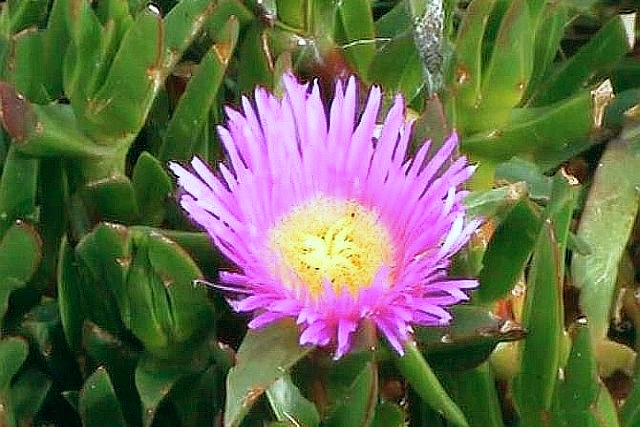 © Toko
© Toko
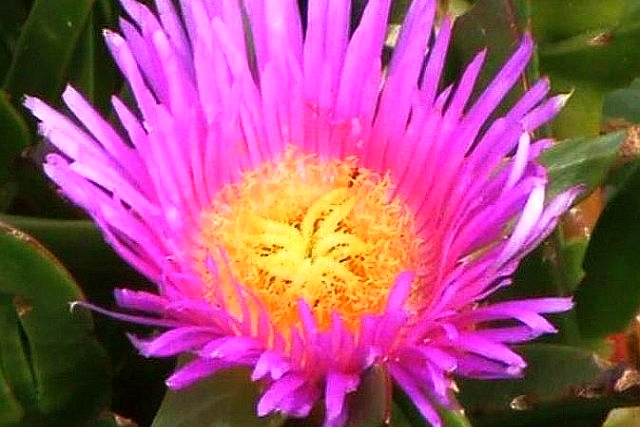 © Toko
© Toko
Table Mountain National Park, Cape Point, Olifantsbos
Description
This species of Carpobrotus ("Sour fig") bears bright pink-purple flowers and, like its relatives, forms a sprawling succulent groundcover. Mat-like succulent perennial with trailing stems up to 1.8m long; leaves opposite, in pairs, partly united at the base, triangular in cross section, up to 90 mm long and 15-20 mm thick, curved, sabre-shaped; flowers (Aug-Oct) brilliant magenta-pink, borne singly at the end of a short stalk, 120 mm in diameter; fruits fleshy, constricted at the base, becoming leathery on drying; receptacle globose to oblong. It can be distinguished from its related species by its short, stout, gray-green leaves. These are mildly curved and shaped like a sabre, having the shape of an isoceles triangle in cross-section, if cut perpendicularly.
Distribution
South African endemic in the Western Cape, South Africa. Here it can be found as far north as Saldanha, across the Cape Peninsula, and as far eastwards as Mossel Bay.
Habitat
Coastal loose sands and rocky outcrops.
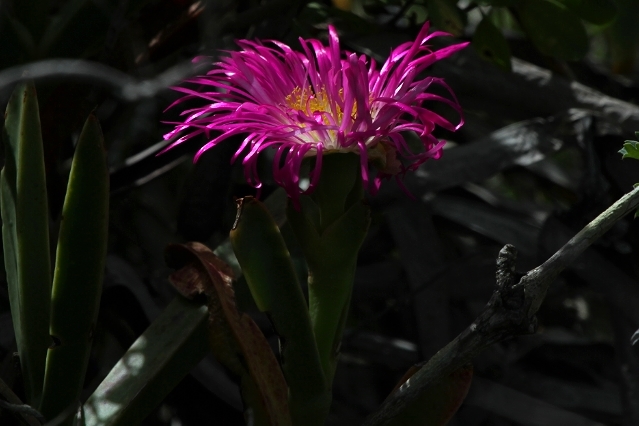 © Tina
© Tina
West Coast National Park
Order: Caryophyllales. Family: Aizoaceae (Mesembryanthemaceae)
 © Toko
© Toko © Toko
© TokoTable Mountain National Park, Cape Point, Olifantsbos
Description
This species of Carpobrotus ("Sour fig") bears bright pink-purple flowers and, like its relatives, forms a sprawling succulent groundcover. Mat-like succulent perennial with trailing stems up to 1.8m long; leaves opposite, in pairs, partly united at the base, triangular in cross section, up to 90 mm long and 15-20 mm thick, curved, sabre-shaped; flowers (Aug-Oct) brilliant magenta-pink, borne singly at the end of a short stalk, 120 mm in diameter; fruits fleshy, constricted at the base, becoming leathery on drying; receptacle globose to oblong. It can be distinguished from its related species by its short, stout, gray-green leaves. These are mildly curved and shaped like a sabre, having the shape of an isoceles triangle in cross-section, if cut perpendicularly.
Distribution
South African endemic in the Western Cape, South Africa. Here it can be found as far north as Saldanha, across the Cape Peninsula, and as far eastwards as Mossel Bay.
Habitat
Coastal loose sands and rocky outcrops.
 © Tina
© TinaWest Coast National Park
Re: Africa Wild Flower Book - Order Caryophyllales
Sweet Hottentots Fig Carpobrotus deliciosus (Perdevy)
Order: Caryophyllales. Family: Aizoaceae (Mesembryanthemaceae)
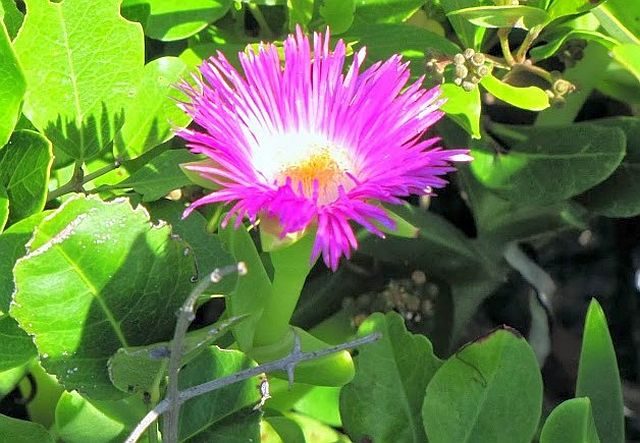 © Lisbeth
© Lisbeth
South Coast, KwaZulu-Natal
Garden Route National Park, Wilderness © All-Nature
Description
A succulent perennial with trailing stems to 2.5 m. The flowers of this Carpobrotus species range in colour from purple and pink to white, and these are followed by purplish fruits in spring that are less sour and more pleasant tasting that those of its relatives, hence its name. Its leaves are almost straight, three-sided, slender and reddish-green in colour, 12-18 mm in diameter.
Distribution
Not endemic to South Africa. Provincial distribution: Eastern Cape, KwaZulu-Natal, native to a strip along the south coast of South Africa. This coastal strip extends along the whole of the Eastern Cape coast, but also extends into the Western Cape as far as Riversdale and into neighbouring KwaZulu-Natal.
Habitat
It is indigenous to the coastal rocks, dunes and plains along the far southern coast of South Africa.
Order: Caryophyllales. Family: Aizoaceae (Mesembryanthemaceae)
 © Lisbeth
© LisbethSouth Coast, KwaZulu-Natal
Garden Route National Park, Wilderness © All-Nature
Description
A succulent perennial with trailing stems to 2.5 m. The flowers of this Carpobrotus species range in colour from purple and pink to white, and these are followed by purplish fruits in spring that are less sour and more pleasant tasting that those of its relatives, hence its name. Its leaves are almost straight, three-sided, slender and reddish-green in colour, 12-18 mm in diameter.
Distribution
Not endemic to South Africa. Provincial distribution: Eastern Cape, KwaZulu-Natal, native to a strip along the south coast of South Africa. This coastal strip extends along the whole of the Eastern Cape coast, but also extends into the Western Cape as far as Riversdale and into neighbouring KwaZulu-Natal.
Habitat
It is indigenous to the coastal rocks, dunes and plains along the far southern coast of South Africa.
Re: Africa Wild Flower Book - Order Caryophyllales
Hottentots Fig, Cape Fig, Sour Fig Carpobrotus edulis (Hottentotsvy, Kaapsevy, Suurvy)
Order: Caryophyllales. Family: Aizoaceae (Mesembryanthemaceae)
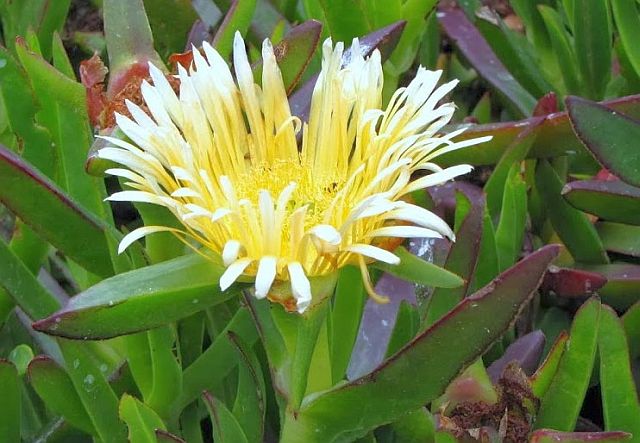 © Lisbeth
© Lisbeth
Western Cape
Description
This species of Carpobrotus forms a sprawling succulent groundcover with trailing stems to 2 m long. A robust, flat-growing, perennial, rooting at nodes and forming dense mats. The succulent horizontal stems curve upwards at the growing point. The leaves are succulent, crowded along the stem, 60-130 x 10-12 mm, sharply 3-angled and triangular in cross-section, yellowish to grass-green, and reddish when older.
Flowers are solitary, 100-150 mm in diameter, yellow, fading to pale pink, produced mainly during late winter-spring (August-October). They open in the morning in bright sunlight, and close at night. Look into the centre of the flower and you'll see many stamens surrounding a beautiful starfish-like stigma. This species is easily distinguished from the others as it is the only one with yellow flowers.
Fruit is fleshy, indehiscent and edible, 35 mm in diameter, shaped like a spinning top, on a winged stalk, becoming yellow and fragrant when ripe. The outer wall of the fruit becomes yellowish, wrinkled and leathery with age. The seeds are embedded in the sticky, sweet, jelly-like mucilage. The fruits can be eaten fresh and they have a strong, astringent, salty, sour taste. They are not as tasty as those of C. acinaciformis and C. deliciosus which are sweeter.
C. edulis is divided into the two subspecies: C. edulis subsp. edulis and C. edulis subsp. parviflorus which has smaller flowers, only reaching 50 mm in diameter, and occurs in the Du Toitskloof Mountains.
Distribution
From Namaqualand in the Northern Cape through the Western Cape to the Eastern Cape.
Habitat
Carpobrotus edulis grows on coastal and inland slopes. It is often seen as a pioneer in disturbed sites.
Order: Caryophyllales. Family: Aizoaceae (Mesembryanthemaceae)
 © Lisbeth
© LisbethWestern Cape
Description
This species of Carpobrotus forms a sprawling succulent groundcover with trailing stems to 2 m long. A robust, flat-growing, perennial, rooting at nodes and forming dense mats. The succulent horizontal stems curve upwards at the growing point. The leaves are succulent, crowded along the stem, 60-130 x 10-12 mm, sharply 3-angled and triangular in cross-section, yellowish to grass-green, and reddish when older.
Flowers are solitary, 100-150 mm in diameter, yellow, fading to pale pink, produced mainly during late winter-spring (August-October). They open in the morning in bright sunlight, and close at night. Look into the centre of the flower and you'll see many stamens surrounding a beautiful starfish-like stigma. This species is easily distinguished from the others as it is the only one with yellow flowers.
Fruit is fleshy, indehiscent and edible, 35 mm in diameter, shaped like a spinning top, on a winged stalk, becoming yellow and fragrant when ripe. The outer wall of the fruit becomes yellowish, wrinkled and leathery with age. The seeds are embedded in the sticky, sweet, jelly-like mucilage. The fruits can be eaten fresh and they have a strong, astringent, salty, sour taste. They are not as tasty as those of C. acinaciformis and C. deliciosus which are sweeter.
C. edulis is divided into the two subspecies: C. edulis subsp. edulis and C. edulis subsp. parviflorus which has smaller flowers, only reaching 50 mm in diameter, and occurs in the Du Toitskloof Mountains.
Distribution
From Namaqualand in the Northern Cape through the Western Cape to the Eastern Cape.
Habitat
Carpobrotus edulis grows on coastal and inland slopes. It is often seen as a pioneer in disturbed sites.
Re: Africa Wild Flower Book - Order Caryophyllales
Narrow-leafed Ice Plant Conicosia elongata
Order: Caryophyllales. Family: Aizoaceae
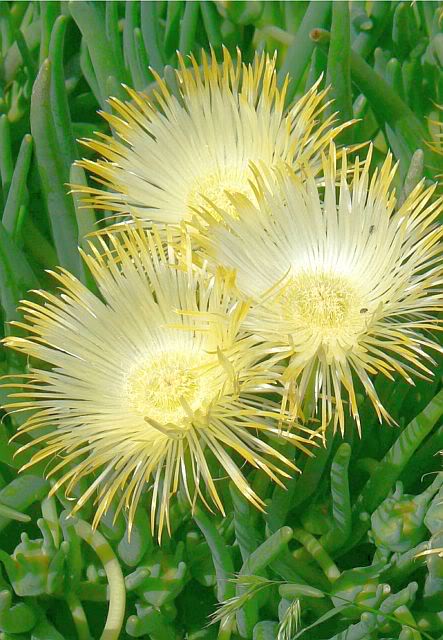
Description
A branching, succulent perennial with tuberous roots. The leaves are long, erect or lax and cylindrical, unlike C. pugioniformis, which has leaves that are triangular in cross-section. Single, pale, yellow flowers on stalks appear in spring. The flowers have narrow petals.
Distribution
South African endemic in the Western and Northern Cape provinces.
Habitat
It grows along the coast and inland on sand and gravel flats.
Order: Caryophyllales. Family: Aizoaceae

Description
A branching, succulent perennial with tuberous roots. The leaves are long, erect or lax and cylindrical, unlike C. pugioniformis, which has leaves that are triangular in cross-section. Single, pale, yellow flowers on stalks appear in spring. The flowers have narrow petals.
Distribution
South African endemic in the Western and Northern Cape provinces.
Habitat
It grows along the coast and inland on sand and gravel flats.
Re: Africa Wild Flower Book - Order Caryophyllales
Hairy Dewflower Drosanthemum hispidum (Skaapvygie)
Order: Caryophyllales. Family: Aizoaceae (Mesembryanthemaceae)
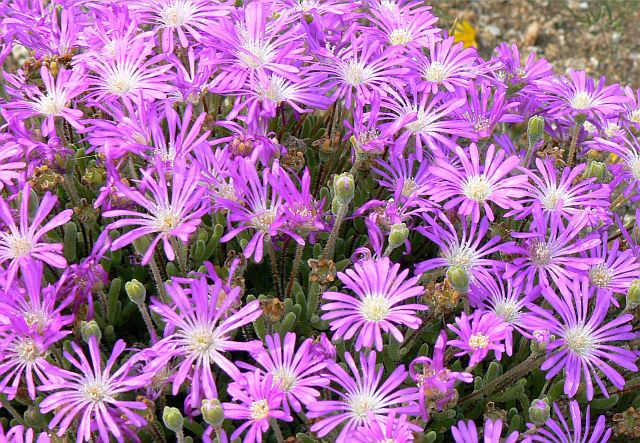
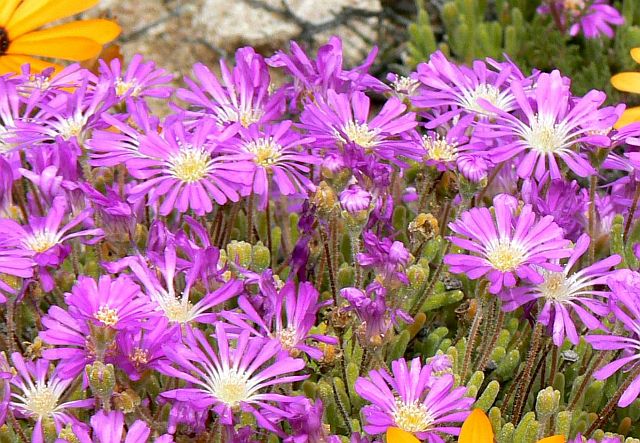
Goegap Nature Reserve, Northern Cape
Description
Succulent mound- or mat-forming perennial. The leaves and the stems are covered with papillae looking like dew drops or glassy beads, leaves covered in raised water cells give a dewy appearance. It has large quantities of 3 to 5 cm wide, purple or lavender flowers in late spring. Small seeds (<1mm) enclosed in a woody 5-locular capsule that opens in the rain to release seeds.
Distribution
Namibia, South Africa (Eastern Cape, Free State, Northern Cape, Western Cape, mainly Namaqualand)
Habitat
Widespread in Succulent Karoo, especially on bottomlands, sandy plains, heuweltjies and disturbed places.
Order: Caryophyllales. Family: Aizoaceae (Mesembryanthemaceae)


Goegap Nature Reserve, Northern Cape
Description
Succulent mound- or mat-forming perennial. The leaves and the stems are covered with papillae looking like dew drops or glassy beads, leaves covered in raised water cells give a dewy appearance. It has large quantities of 3 to 5 cm wide, purple or lavender flowers in late spring. Small seeds (<1mm) enclosed in a woody 5-locular capsule that opens in the rain to release seeds.
Distribution
Namibia, South Africa (Eastern Cape, Free State, Northern Cape, Western Cape, mainly Namaqualand)
Habitat
Widespread in Succulent Karoo, especially on bottomlands, sandy plains, heuweltjies and disturbed places.
Re: Africa Wild Flower Book - Order Caryophyllales
Bleek Kruip Vygie Prenia pallens, Mesembryanthemum lanceum
Order: Caryophyllales. Family: Aizoaceae (Mesembryanthemaceae)
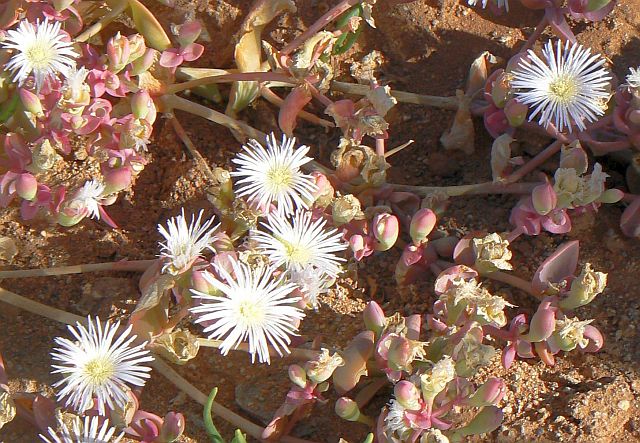 P. pallens ssp. lancea
P. pallens ssp. lancea
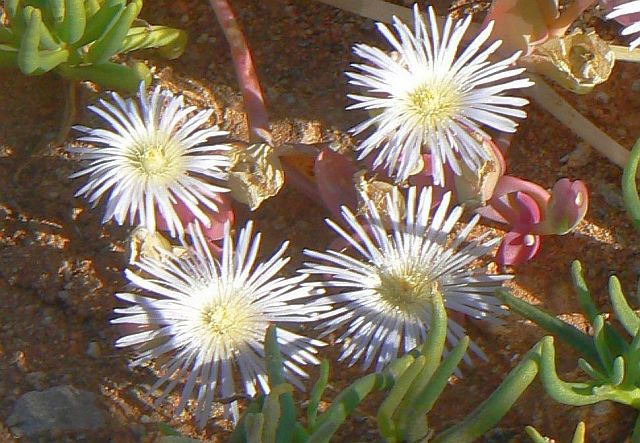
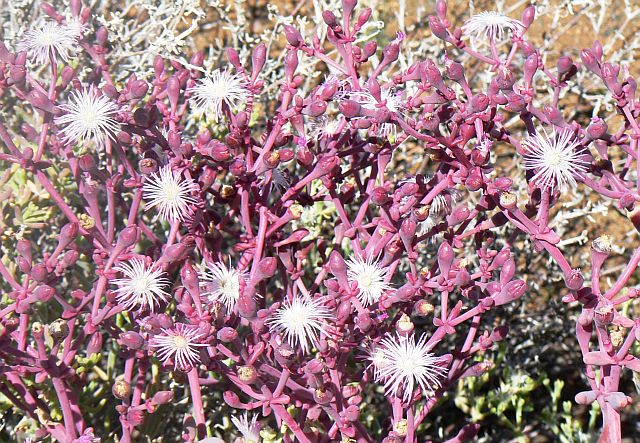
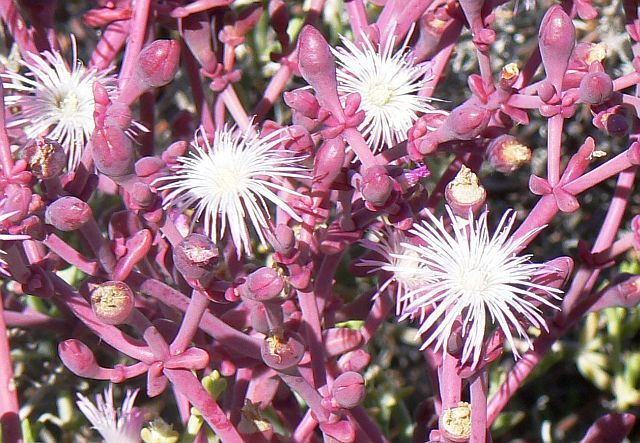
Richtersveld National Park, Northern Cape
Description
Prostate creeping perennial with creeping annual stems radiating from a tuft of slender, pale greyish succulent leaves. It has few fat knobby leaves, white or pinkish flowers with very thin petals. Leaves succulent, in well spaced pairs along the rampling stems, or in single pairs on branched erect stems. Leaves flatly triquetros, ovate. More rounded leaves along the flowering braches. Flowers at the tips of the long, creeping branches, pale pink with white centre or yellow, on heavy stalks arising from axils of the leaf pairs - with multiple stamens, many petals tapering at the tips.
Distribution
Northern Cape, Western Cape.
Habitat
Disturbed places of the planes or along roadsides, winter rainfall areas.
Order: Caryophyllales. Family: Aizoaceae (Mesembryanthemaceae)
 P. pallens ssp. lancea
P. pallens ssp. lancea


Richtersveld National Park, Northern Cape
Description
Prostate creeping perennial with creeping annual stems radiating from a tuft of slender, pale greyish succulent leaves. It has few fat knobby leaves, white or pinkish flowers with very thin petals. Leaves succulent, in well spaced pairs along the rampling stems, or in single pairs on branched erect stems. Leaves flatly triquetros, ovate. More rounded leaves along the flowering braches. Flowers at the tips of the long, creeping branches, pale pink with white centre or yellow, on heavy stalks arising from axils of the leaf pairs - with multiple stamens, many petals tapering at the tips.
Distribution
Northern Cape, Western Cape.
Habitat
Disturbed places of the planes or along roadsides, winter rainfall areas.
-
Sharifa
Re: Africa Wild Flower Book - Order Caryophyllales
Cape Leadwort, Plumbago Plumbago auriculata
Order: Caryophyllales. Family: Plumbaginaceae
Kruger National Park © mposthumus
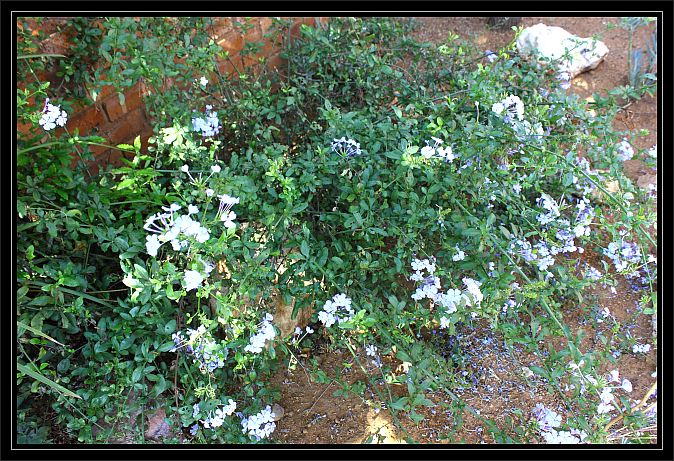
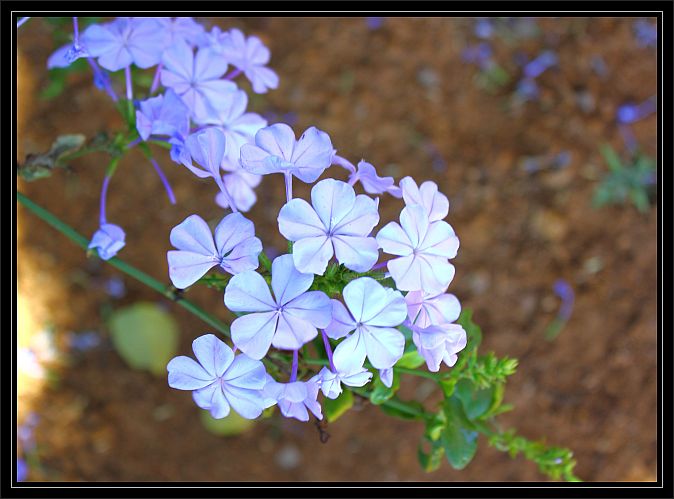
Garden in Gauteng
Description
Plumbago is an extremely reliable, resilient plant which has been popular for home gardens as well as for commercial landscapes for many years.
In nature plumbago is a scrambling shrub, about 3m x 3m. It grows in scrub and thicket (valley bushveld). The new growth is bright green, darker when mature. The leaves are thin in texture and have minute gland dots. The leaf stalk is winged at the base, and clasps the stem. Underneath the leaves are greyish green, sometimes with whitish scales apparently for light reflection.
In summer the bush is covered with pretty trusses of pale sky blue flowers, although there are often flowers at other times of the year. The main flowering period is between November and May. "Royal Cape" is a darker blue form which is available in many nurseries. There is also a white form which is very attractive. It is slightly less vigorous than the normal blue but is a prolific flowerer and wonderful for working gardeners who only see their gardens in the twilight - the white blooms appear to glow in the dusk.
A relatively recent South African trend is to attract birds and other wildlife to gardens by creating the right habitat. Plumbago makes a good, fast growing "exclusion zone" or bush-clump plant for attracting birds such as robins which like dense plant growth.
Distribution
The distribution ranges from the southern Cape, Eastern Cape and into KwaZulu-Natal. It appears in Gauteng and the adjacent areas of the Free State and North West Province. There is also an isolated distribution in Mpumalanga.
Habitat
Plumbago shares a habitat with Tecomaria capensis, the Cape Honeysuckle.
It is fast growing, drought resistant and rewarding and will grow in any soil but will perform best if planted with plenty of compost. Plumbago is somewhat frost tender but will quickly re-grow if damaged.
Links: Braam Van Wyk: A Photographic Guide to Wild Flowers of South Africa
Order: Caryophyllales. Family: Plumbaginaceae
Kruger National Park © mposthumus


Garden in Gauteng
Description
Plumbago is an extremely reliable, resilient plant which has been popular for home gardens as well as for commercial landscapes for many years.
In nature plumbago is a scrambling shrub, about 3m x 3m. It grows in scrub and thicket (valley bushveld). The new growth is bright green, darker when mature. The leaves are thin in texture and have minute gland dots. The leaf stalk is winged at the base, and clasps the stem. Underneath the leaves are greyish green, sometimes with whitish scales apparently for light reflection.
In summer the bush is covered with pretty trusses of pale sky blue flowers, although there are often flowers at other times of the year. The main flowering period is between November and May. "Royal Cape" is a darker blue form which is available in many nurseries. There is also a white form which is very attractive. It is slightly less vigorous than the normal blue but is a prolific flowerer and wonderful for working gardeners who only see their gardens in the twilight - the white blooms appear to glow in the dusk.
A relatively recent South African trend is to attract birds and other wildlife to gardens by creating the right habitat. Plumbago makes a good, fast growing "exclusion zone" or bush-clump plant for attracting birds such as robins which like dense plant growth.
Distribution
The distribution ranges from the southern Cape, Eastern Cape and into KwaZulu-Natal. It appears in Gauteng and the adjacent areas of the Free State and North West Province. There is also an isolated distribution in Mpumalanga.
Habitat
Plumbago shares a habitat with Tecomaria capensis, the Cape Honeysuckle.
It is fast growing, drought resistant and rewarding and will grow in any soil but will perform best if planted with plenty of compost. Plumbago is somewhat frost tender but will quickly re-grow if damaged.
Links: Braam Van Wyk: A Photographic Guide to Wild Flowers of South Africa
- Flutterby
- Posts: 43938
- Joined: Sat May 19, 2012 12:28 pm
- Country: South Africa
- Location: Gauteng, South Africa
- Contact:
Re: Africa Wild Flower Book - Order Caryophyllales
Porcupine Root, Flameflower Talinum caffra (Ystervarkwortel)
Order: Caryophyllales. Family: Portulacaceae
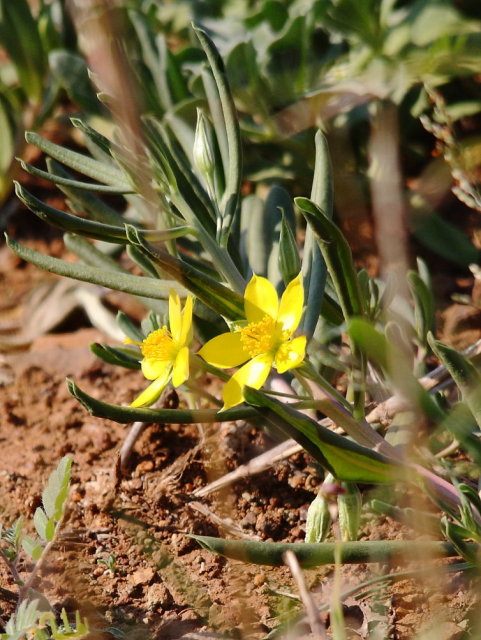
Description
Erect or sub-erect perennial herb, up to 40 cm tall, growing from a swollen tuber-like root. Leaves and stems somewhat fleshy. Leaves elliptic-lanceolate, up to 6 × 1.5 cm; margin sometimes rolled under. Flowers axillary, mostly solitary, rarely in clusters of 2-3, yellow,up to 2 cm in diameter, opening in the afternoon and fading by nightfall. Fruit a subglobose capsule. Seeds c. 20, shiny black with a white hilum, 1.5-2 mm in diameter, with raised concentric ridges on the surface (visible with a lens).
Distribution
From Ethiopia, Sudan to Angola, Namibia and South Africa (Eastern Cape, Free State, Gauteng, KwaZulu-Natal, Limpopo, Mpumalanga, Northern Cape, North West).
Habitat
Occurring in open woodland or grassland.
Order: Caryophyllales. Family: Portulacaceae

Description
Erect or sub-erect perennial herb, up to 40 cm tall, growing from a swollen tuber-like root. Leaves and stems somewhat fleshy. Leaves elliptic-lanceolate, up to 6 × 1.5 cm; margin sometimes rolled under. Flowers axillary, mostly solitary, rarely in clusters of 2-3, yellow,up to 2 cm in diameter, opening in the afternoon and fading by nightfall. Fruit a subglobose capsule. Seeds c. 20, shiny black with a white hilum, 1.5-2 mm in diameter, with raised concentric ridges on the surface (visible with a lens).
Distribution
From Ethiopia, Sudan to Angola, Namibia and South Africa (Eastern Cape, Free State, Gauteng, KwaZulu-Natal, Limpopo, Mpumalanga, Northern Cape, North West).
Habitat
Occurring in open woodland or grassland.
- nan
- Posts: 26436
- Joined: Thu May 31, 2012 9:41 pm
- Country: Switzerland
- Location: Central Europe
- Contact:
Re: Africa Wild Flower Book - Order Caryophyllales
Katstert Hermbstaedtia fleckii
Order: Caryophyllales. Family: Amaranthaceae
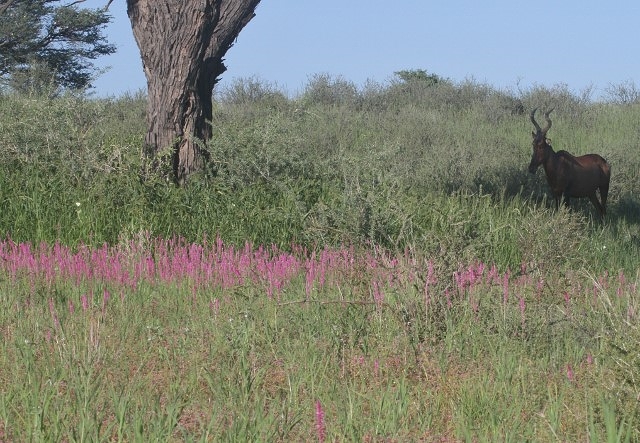 © nan
© nan
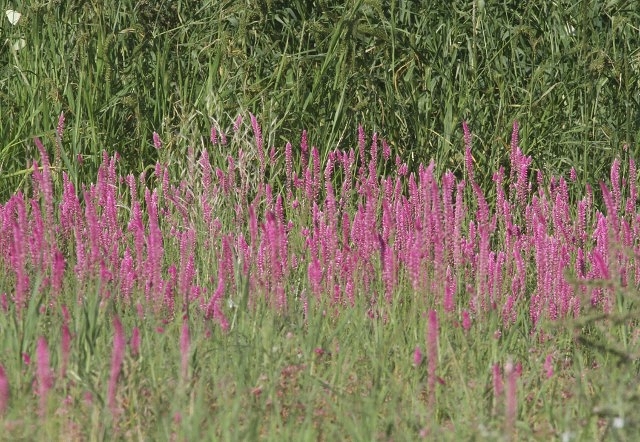 © nan
© nan
seen in the Kgalagadi, 17.2.2011
Description
An annual, erect, simple or branched herb, up to 600 mm tall. Hairy leaves are linear, and up to 60 mm long. The inflorescence is a terminal spike. Purple flowers.
Distribution
Botswana, Zimbabwe, Namibia, South Africa
Habitat
Usually recorded from sand (red or grey-brown Kalahari) on basalt, in pans, alluvium or river banks. One of the most frequent and obivous flowers after good rains.
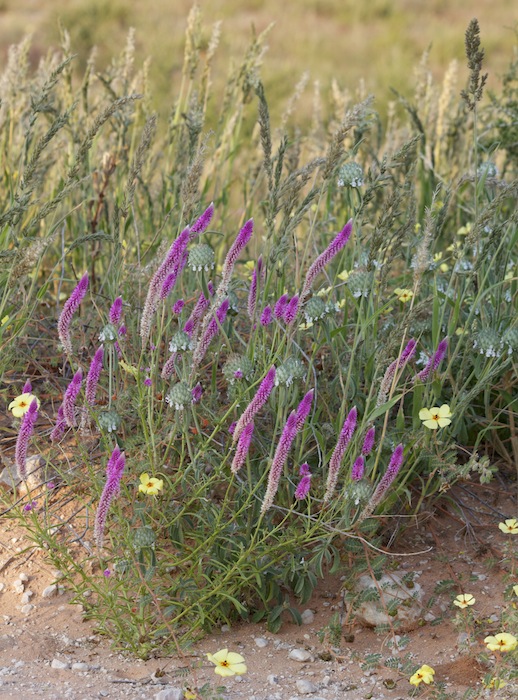 © ExFmem
© ExFmem
Kgalagadi Transfrontier Park
Order: Caryophyllales. Family: Amaranthaceae
 © nan
© nan © nan
© nanseen in the Kgalagadi, 17.2.2011
Description
An annual, erect, simple or branched herb, up to 600 mm tall. Hairy leaves are linear, and up to 60 mm long. The inflorescence is a terminal spike. Purple flowers.
Distribution
Botswana, Zimbabwe, Namibia, South Africa
Habitat
Usually recorded from sand (red or grey-brown Kalahari) on basalt, in pans, alluvium or river banks. One of the most frequent and obivous flowers after good rains.
 © ExFmem
© ExFmemKgalagadi Transfrontier Park
Kgalagadi lover… for ever
https://safrounet.piwigo.com/
https://safrounet.piwigo.com/


